国际商务谈判(英文)Unit 02 Make an offer
国际商务谈判(英文)Unit 02 Make an offer

Unit 2 Make an oe enquiry is completed,a quotation or an offer follows.It usually takes a very short time to make a quotation or an offer,yet making a proper quotation or offer means a lot to the sellers and buyers.In this unit, you are required to understand the difference between an offer and a quotation as well as the skills and tactics of making an offer or a quotation.
Unit 2 Make an offer
Let’s learn some sample dialogues
❖ Refer to the textbook
Unit 2 Make an offer
Let’s practice
❖ Practice in groups ❖ Practice with: cue card. doc ❖ Show what you have practiced ❖ Students’ comment ❖ Teacher’s comment
❖ Firm offer ❖ Non-firm offer ❖ Original offer ❖ Offerer ❖ Offeree ❖ Counter-offer ❖ Legal promise ❖ Acceptance
国际商务谈判英文版最新版教学课件第2章

• Self-assessment • Assessment of the counterparty • Assessment of the situation
批注本地保存成功开通会员云端永久保存去开通
2-1
Part One The Essentials of Negotiation
— Chapter 2 — Preparation:
What to Do Before Negotiation
2-2
The Fixed-Pie Perception
Most negotiators believe whatever is good for one party must be bad for the counterparty.
People with this fixed-pie perception take one of three mindsets when preparing for a negotiation:
• Resign themselves to capitulating to the counterparty
2-11
Self-Assessment: Endowment Effects
Differences in negotiators’ reference points may lead buyers and sellers to have different valuations for the same object
• Brainstorm your alternatives. • Evaluate and order each alternative’s value. • Attempt to improve your BATNA. • Determine your reservation price based on facts. • See Exhibit 2-1.
商务谈判常用的英语口语对话
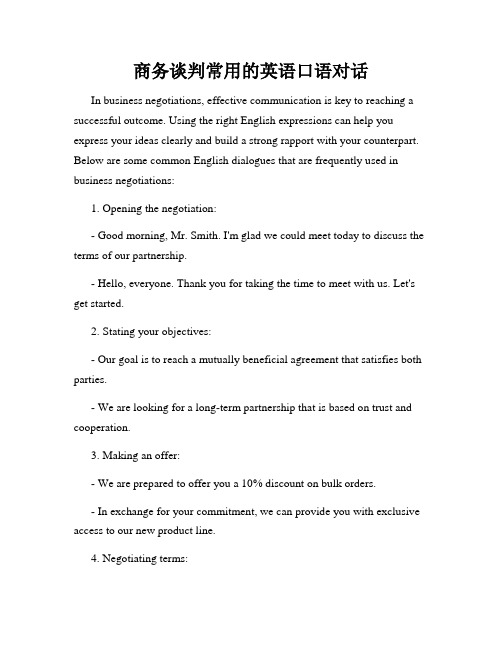
商务谈判常用的英语口语对话In business negotiations, effective communication is key to reaching a successful outcome. Using the right English expressions can help you express your ideas clearly and build a strong rapport with your counterpart. Below are some common English dialogues that are frequently used in business negotiations:1. Opening the negotiation:- Good morning, Mr. Smith. I'm glad we could meet today to discuss the terms of our partnership.- Hello, everyone. Thank you for taking the time to meet with us. Let's get started.2. Stating your objectives:- Our goal is to reach a mutually beneficial agreement that satisfies both parties.- We are looking for a long-term partnership that is based on trust and cooperation.3. Making an offer:- We are prepared to offer you a 10% discount on bulk orders.- In exchange for your commitment, we can provide you with exclusive access to our new product line.4. Negotiating terms:- Can we discuss the possibility of extending the payment deadline by an additional 30 days?- We are willing to compromise on the price if you can guarantee a minimum order quantity.5. Responding to offers:- Your proposal is very attractive. However, we would like to negotiate the delivery schedule.- We appreciate your offer and will consider it carefully before making a decision.6. Seeking clarification:- Could you provide more details on the warranty terms for this product?- I'm not clear on the pricing structure. Could you break it down for me?7. Closing the deal:- It seems like we have reached a consensus on the terms. Shall we draw up a contract?- I believe we have addressed all the issues. Let's finalize the agreement and move forward.Remember, effective communication in business negotiations requires active listening, clear expression, and a willingness to compromise. By using these common English dialogues, you can improve your negotiation skills and achieve successful outcomes in your business dealings.。
国际商务谈判(第二版)unit02makeanoffer
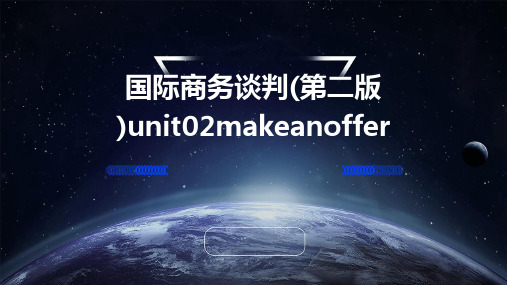
价格谈判
1 2
价格调整
在谈判过程中,可以根据客户的反馈和需求,适 当调整价格。
附加条件
除了价格本身,还可以通过附加条件来争取更好 的谈判结果。
3
谈判底线
明确自己的谈判底线,不要轻易让步,同时也要 了解客户的底线。
达成协议
合同签订
在达成协议后,需要签订书面合同,确保双方 的权益得到保障。
后续跟进
协议签订后,需要跟进客户的需求和反馈,确 保合作顺利进行。
02
提出报价前的准备
市场调研
了解市场需求
通过市场调研,了解目标市场的需求、消费者偏好以 及潜在的竞争对手情况。
分析市场规模
评估市场规模和增长潜力,以便预测未来的市场趋势。
确定目标市场
根据市场调研结果,确定产品或服务的目标市场,并 制定相应的营销策略。
产品定位
明确产品特点
01
了解产品或服务的独特卖点,以及与竞争对手的差异。
文化差异影响
国际商务谈判中,文化差 异对谈判结果产生重要影 响,需要充分了解和尊重 对方文化。
谈判目标
达成合作协议
通过谈判,双方就合作事 宜达成一致意见,签订合 同或协议。
实现利益最大化
在谈判中争取自身利益的 最大化,同时也要考虑对 方的利益诉求。
建立长期合作关系
通过谈判,建立互信和良 好的合作关系,为未来的 合作打下基础。
报价方式
直接报价
直接列出产品或服务的价格,简单明了。
对比报价
通过对比其他产品或服务的价格来突出自己产品的优势。
分解报价
格构成。
报价技巧
高开低走
报价时先报一个较高的价格,然后逐渐降低价格,以吸引客户。
国际商务谈判(英文) 全套课件-PPT资料238页
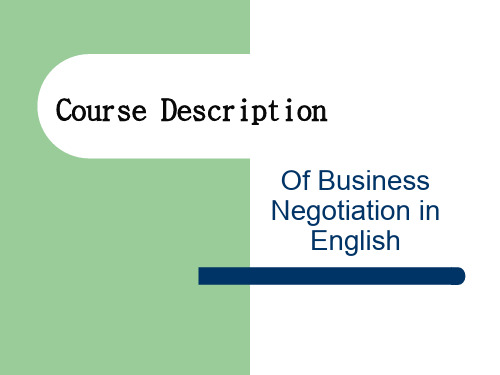
考核方式
商务谈判口语是一门专门用途口语课程,因此考 试形式为团队对抗模拟谈判的口语考试。从一开 始明确考核的方式是团队考核,每个成员要发挥 作用,否则影响团队分数。在学期初形成固定的 谈判代表队, 最后用抽签的方法决定最后的谈 判模拟中哪一队和哪一队进行谈判。
Unit 1 Making an Enquiry
3.What do you usually ask for in the enquiries?
Catalogue,sample,price-list,quotation,terms of payment, date of delivery,etc
4.How do you invite a best possible price in an enquiry?
Teacher-centered
Explanation of language expressions, special terms, negotiation skills and concerned knowledge
Student-centered
Practice in the situation offered in groups
3. Three Steps to Follow :
Different items and situations demand different skills, generally you have to follow three steps:
1)devise a target 2) do some preparations 3) negotiate for the target
国际商务谈判对话

国际商务谈判对话缺乏经验的谈判者的最大弱点是不能耐心地听对方发言,他们认为自己的任务就是谈自己的情况,说自己想说的话和反驳对方的反对意见。
所以在国际商务谈判中要注意听国际商务谈判中的对话。
下面店铺整理了国际商务谈判对话,供你阅读参考。
国际商务谈判对话:情景对话1. 商务英语谈判经典句1 If you take quality into consideration, you will find our price reasonable.如果您把质量考虑进去的话,您会发现我方价格是合理的。
2 We guarantee quality products which can stand fierce competition.我们保证提供能经得起激烈竞争的高质量产品。
3 I still have some questions concerning our contract.就合同方面我还有些问题要问。
4 We are always willing to cooperate with you and if necessary make some concessions.我们总是愿意合作的,如果需要还可以做些让步。
5 If you have any comment about these clauses, do not hesitate to make.对这些条款有何意见,请尽管提,不必客气。
6 Do you think there is something wrong with the contract?你认为合同有问题吗?7 We'd like you to consider our request once again.我们希望贵方再次考虑我们的要求。
8 We'd like to clear up some points connected with the technical part of the contract.我们希望搞清楚有关合同中技术方面的几个问题。
(商务谈判)价格谈判英译

04/1)Good morning, Mr. Hunter. Nice to see you again.Good morning, Ms. Li. You too. Oh, you look good.Thanks. Have a seat please.Thanks.Mr. Hunter, you are here for the walnut meat. Am I right? Yes. Please make an offer for the walnut meat that can be supplied from stock.Ok. You are lucky, Mr. Hunter. We 've just laid the goods in stock. By the way, do you have any special requirement for packing?No. Just the regular solid and seaworthy packing will do.I am glad to make you a firm offer for 250 metric tons of walnut meat at $420 per metric ton, CIF New York to be delivered by the end of Feb 1997.How long will the offer remain open?The offer is subject to acceptance within 5 days.Ms Li, as far as I know, your price has gone up by almost 10% compared to the same period of last year. It 's hard for usto make any sales at this price. I hope you could lower the price/make some reduction to the price.Mr. Hunter, you must have been aware that during the past few months, the prices for walnut have gone up greatly, but our price is still lower than others '. You 'd better give it an all-round consideration. Our walnut meat is of high quality and walnut meat from other sources can hardly compete with ours.I admit that your walnut meat is of better quality. But sucha price makes it hard for us to persuade our clients to buy your product. Plus, the fierce competition from the Korean and Thai suppliers can not be ignored. Ms Li, how about cutting your price by 6%?Our offer has been made after the consideration of different factors, including the rising tendency of the world market.If I were you, I wouldn 't worry at all. We could assure you that our offer is very reasonable if you give it an all-round consideration. I don 't think there will be any problem foryou to market our products. Frankly speaking, but for our long-term relationship, we wouldn 't have made you such an offer.The market prices are changing all the time. How can I be sure that the price won ' t fall before the goods arrive at our port? It's up to you.If you could guarantee delivery by January, I could then make a decision. It seems that the market won t fall be'fore then. It would be the best if delivery is in Feb. but we can promise to you that we will try our best to make delivery as early as possible.Good. By the way, do you allow any commission?I am sorry, Mr. Hunter. Our offer is not with commission.04/2)We are interested in your cotton yarn products. How is your supply situation?Here is our catalogue. Most of the items in it can be supplied from stock.It 's great. Can you quote for the items listed in the catalogue?Here is the price sheet. But these prices are subject to our final confirmation. If you inquire specifically, we could make you firm offers.Thanks. Here is our inquiry list with the categories, specification and numbers listed.Thanks. We will go over your inquiry list and make you a firm offer tomorrow.Ms Liu, I don 't think I need to remind you that the competition is getting increasingly fierce.Mr. Hanson, you will find our offers very favorable.Good. By the way, do you offer FOB or CIF prices?Both will do. But we usually offer CIF prices without commission.Ms Liu, it 's the first deal between us. As we ' ve never handled your products at our end, we hope you could make some reduction so as to help us introduce your products into our market.I will see what I can do.Ok, see you tomorrow.See you tomorrow.I studied your price list yesterday. I need not point outthat your prices are too high for us to accept, nearly twice as much as the prices I can get elsewhere.You should not separate price from quality. And actually, the first consideration should be given to quality.Everybody knows that when comparing prices quality shouldbe taken into consideration. It ' sju st because that I' ve notice the quality of your products that I am here to talk business with you.Good. There are cheap goods in the market. Mr. Hanson, if you take notice of the quality of our product you will find that our prices are very favorable.To be honest, it 's hard for us to market your product. If you don 't make any reduction, I will have to turn to other suppliers.Ok, we agree to make some reduction. Mr. Hunter, please giveus an indication of the quantity you need.1500 to 2000 pieces for cotton yarn product Art. Number A150 and B225 respectively.Thanks. A 150 can be supplied from stock. and delivered immediately.Good. Please offer us your best price for 1500 pieces. Ok. I am glad to offer you 1500 pieces of cotton yarn Art. No. 150 at $120 CIF Hamburg to be delivered within 21 days after the receipt of your L/C.Thank you for your offer. How about B 225? We need 2000 pieces of that.As to B225, it 's out of stock at the moment. But we will tryOur offer is $126 per piece CIF Hamburg for cotton yarn our best to meet yourdemand. Please offer forgoods August/September.I afraid August/SeptemberSeptember/October?Ok. Let that can be deliver ed in won 't do. How about s make it September/October.products Art. No. b225 to be delivered in Sep/Oct. Mr. Hanson, both of these offers are subject to acceptance within 7 days. Fine. How would you like to be paid?Letter of credit.Thank you for you offer. I need to think it over and consult withmy colleague. I will give you a reply in 2 or 3 days.Take you time, Mr. Hanson. The offers are open for 7 days.05/01Good morning, Mr. Anderson.Good morning.Tea or coffe?Tea please.After studying your inquiry list we found that most of the items you need are in stock. What do you think of our prices? Rather on the high side, I 'm afraid.I am very sorry to hear that. We always offer the best pricesforour clients in order to make our prices in line with theworldmarket.Frankly speaking, we 've received several offers from other suppliers and their prices are about 10% lower than yours. How could it be? What we are talking about must be goods of different quality. As far as our down products are concerned, there is little profit margin for us at this price.We know that your products are of good quality, especially the down quilts and garments. But we are talking about 20000 quilts and 30000 garments. Can you make any reductions?Mr. Anderson, as I said before, the problem is that we have taken the quantity into consideration when making you the offer. So, you 'd better take notice of our quality. By the way, have you compare our products with other suppliers ' ? are they in the same class?Your products do have some advantages over theirs, but the price difference shouldn ' t be as much as 10%. If you don 'tmake any reduction on price, we 'll have to turn to other suppliers.How much reduction do you have in mind?A 6% reduction would be very reasonable.Mr. Anderson, you are asking too much. A 6% reduction is beyond consideration. We could never go as far as 6%. Then how much can you lower your price?1%.4%?Oh, I 'm afraid that ' ll be too low for us to accept. The bestwe could do is 2%.You say 2%, and I say 4%. Let 's split the difference and meet each other half way and make 3%. What do you say?I am sorry but I still can not accept that.How about 2.5%?Mr. Anderson, I appreciate your effort towards concluding thisdeal and your sincerity as well. To show our goodwill, weaccept your bid.Thanks.Mr. Anderson, let 's recap on what we have agreed so far.We'll sell you 20000 down quilts and 30000 down garmentsto be delivered in 2 month from August at $ 18.6 for each quilt and $16.8 each garment, CIF Vancouver payable by l/c. Good. That 's a deal. Thanks.05/02Mr. zhang, I am honored to have the opportunity to visit your company. I am impressed by some of the items displayed in the showroom.What items are you interested in most?The T shirts. They look nice.Thanks. Our T shirts are famous for their high quality and are well received by youngsters in the overseas market, especially in your county.Mr. Zhang, the Korean T shirts are also very popular in our market.I can say T shirts from other sources are not attractive but after seeing ours, you will find them particular in texture, fashionable in patterns and delicate in workmanship.How about the prices? Can you quote us a competitive price? Mr. Zhang, you must have been aware that the prices ofthe Korean T shirts are very competitive.Yes, I am. But I need to remind you that when comparing prices you must take the quality into first consideration. As long as the quality is good, our customers will not care too much about the prices.Mr. Zhang, I agree. As long as the quality is good, it doesn't matter if the price is a little high.The products we offer are not only superior in quality but also reasonable in price.I am glad to hear that. Mr. Zhang, if you could offer us a really competitive price, maybe we can place a large order with you.“ a large order ”? can you give me an indication of theexact quality you might order?Let's say 2000 dozen T shirts.2000 dozen? Mr. Steven, you must be kidding. 2000 dozen is indeed a very small number, so we could not offer you any competitive prices.Then how about 20,000 dozen?Oh, that 's much better. We are now ready to offer your 20000 dozen T shirts at $ 22.6 FOB Qingdao.Mr. Zhang, you must be kidding. A friend of mine told me that you once sold him 200000 dozen T shirts at $ 18 FOB Qingdao. Is it Mr Frazel from ABC trading company in New York?Yes. It's him that told me you sell products of high quality at reasonable prices.Mr. Frazal is an old customer of ours. We did conclude a deal at this price. But that 's half a year ago. During this period, the market situation has changed greatly. As far as I know, the market has become rather firm. As I see it, with the coming of the season, the market is about to rise. As a businessman, you must have been very familiar with thecurrent world market.I certainly am. Frankly speaking, I have received several offers, most of which are below 20 dollars per dozen.20 dollars per dozen? How could it be? May I ask from where you got such offers?Most of them were from Korea and south Asian countries, such as the Filipines and Singpore.Oh, I see. Mr. steven, you 'd better compare our products with other suppliers ' before placing the orders. If you can 't accept our prices, you could purchase from them.Mr. Zhang, compared to other supplier s ', your prices are indeed higher.Mr. Steven, you 'd better take the following facts into consideration:1)the world market has changed greatly, and the sellers haveadvantages over the buyers now.2)the prices for different raw materials have gone up greatly,and as a result the price of our cotton yarn has gone upcontinuously during the past 6 month.3)The supply-demand situation has changed greatly during thepast period of time, and you must have been aware of that.As we have a great number of orders, I am afraid our Tshirts can not meet the demand.Mr. Zhang, thank you for you detailed explanation. Can you lower the price a little bit?What 's your counter offer?How about 20.5 dollars per dozen?We could hardly make any profit at this price.When do you expect us to make delivery?As we are in urgent need of the goods, I hope you could make early delivery. How about delivery within one month from now? It's hard for us to make delivery within one month at his price, as delivery within such a short tiem will increase our cost.How about 21.50 dollars then?Mr. Steven, this is our first deal. I sincerely hope that we could conclude this deal. I am ready to take a step forward.Let 's split the difference and meet each other half way and make it 22 dollars per dozen.Oh, Mr.zhang , you talked me into it. Ok, I agree. I will place an order with you for 20000 dozen T shirts at 22dollars per dozen FOB Qingdao , to be delivered within one month from now.。
国际商务谈判 chapter 2
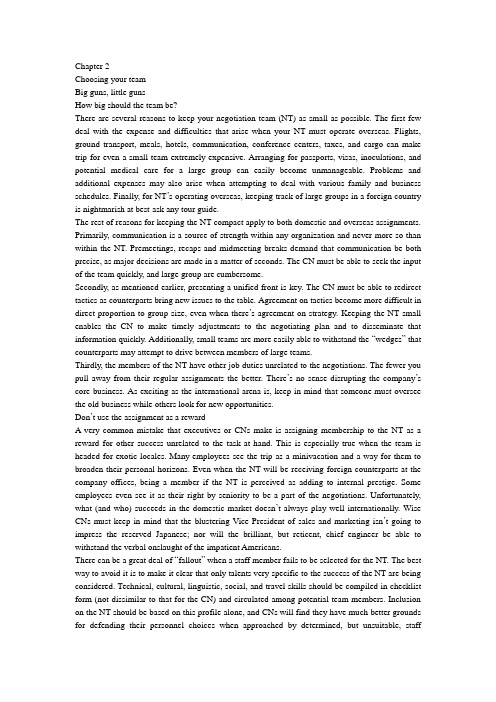
Chapter 2Choosing your teamBig guns, little gunsHow big should the team be?There are several reasons to keep your negotiation team (NT) as small as possible. The first few deal with the expense and difficulties that arise when your NT must operate overseas. Flights, ground transport, meals, hotels, communication, conference centers, taxes, and cargo can make trip for even a small team extremely expensive. Arranging for passports, visas, inoculations, and potential medical care for a large group can easily become unmanageable. Problems and additional expenses may also arise when attempting to deal with various family and business schedules. Finally, for NT’s operating overseas, keeping track of large groups in a foreign country is nightmarish at best-ask any tour guide.The rest of reasons for keeping the NT compact apply to both domestic and overseas assignments. Primarily, communication is a source of strength within any organization and never more so than within the NT. Premeetings, recaps and midmeeting breaks demand that communication be both precise, as major decisions are made in a matter of seconds. The CN must be able to seek the input of the team quickly, and large group are cumbersome.Secondly, as mentioned earlier, presenting a unified front is key. The CN must be able to redirect tactics as counterparts bring new issues to the table. Agreement on tactics become more difficult in direct proportion to group size, even when there’s agreement on strategy. Keeping the NT small enables the CN to make timely adjustments to the negotiating plan and to disseminate that information quickly. Additionally, small teams are more easily able to withstand the “wedges” that counterparts may attempt to drive between members of large teams.Thirdly, the members of the NT have other job duties unrelated to the negotiations. The fewer you pull away from their regular assignments the better. There’s no sense disrupting the company’s core business. As exciting as the international arena is, keep in mind that someone must oversee the old business while others look for new opportunities.Don’t use the assignment as a rewardA very common mistake that executives or CNs make is assigning membership to the NT as a reward for other success unrelated to the task at hand. This is especially true when the team is headed for exotic locales. Many employees see the trip as a minivacation and a way for them to broaden their personal horizons. Even when the NT will be receiving foreign counterparts at the company offices, being a member if the NT is perceived as adding to internal prestige. Some employees even see it as their right by seniority to be a part of the negotiations. Unfortunately, what (and who) succeeds in the domestic market doesn’t always play well internationally. Wise CNs must keep in mind that the blustering Vice President of sales and marketing isn’t going to impress the reserved Japanese; nor will the brilliant, but reticent, chief engineer be able to withstand the verbal onslaught of the impatient Americans.There can be a great deal of “fallout” when a staff member fails to be selected for the NT. The best way to avoid it is to make it clear that only talents very specific to the success of the NT are being considered. Technical, cultural, linguistic, social, and travel skills should be compiled in checklist form (not dissimilar to that for the CN) and circulated among potential team members. Inclusion on the NT should be based on this profile alone, and CNs will find they have much better grounds for defending their personnel choices when approached by determined, but unsuitable, staffmembers. This is especially true when other executives and managers assume they’re going to be part of the NT. As a way of preserving morale among those left off of the NT roster, some CNs make the deferrees part of the prenegotiation strategy planning process.A balance of skills and strengthsIt’s unlikely that any single team member will embody all of the talents necessary to achieve the company’s strategy. The CN must choose a cross-section of technical skills and personal attributes that will create a compact and efficient team. One team member’s weakness must be offset by another’s strength. Technical prowess must be a accompanied by the ability to communicate and apply that prowess. Putting a team together is similar to assembling a jigsaw puzzle: there’s no success unless all of the pieces fit.A common practice among experienced travelers when packing for trips is to never put anything in the suitcase that has “only one use”; the same applies to choosing NT members. A specialist candidate is eschewed in favor of the generalist unless the technical expertise is absolutely crucial to the effort. If the CN must include these “one trick ponies,” every attempt should be made to make them a part of the wider strategy and tactics discussions. If that’s unsuccessful, these specialist members should be cautioned to advise in private during negotiations and to avoid direct involvement.Painting the “big picture”Although many technical types will disagree, it’s much easier to impart technical knowledge to a good communicator than it is to do the reverse. Members of the NT must be chosen for their ability to effectively execute the company’s strategy and to quickly respond to the tactics of counterparts. This is accomplished only through good communications skills. Scientific and financial technical skills will take a back seat, especially during initial negotiations, as the “big picture” is discussed. Details will be left until much later in the process. Many business cultures prefer to have the details tended to after the contract is signed.Bringing massive technical data to the negotiating table may only slow down the deal-making process.NOTE: Much “expertise can be carried in file or laptop form, in case it should be needed during discussions.Tasks Both Large and smallMajor decisions are made every day during negotiations, but not all of the work is momentous. Some companies and consultant CNs make the mistake of including only “big guns” on the team. This causes problems, as no one relishes doing the necessary but tedious (and decidedly unglamorous ) work that keeps negotiations running smoothly—getting copies, typing policy changes, taking notes, arranging dinners, and so on .Including a few junior managers or administrators in the ranks of the NT for the sole purpose of controlling logistics is a wise move. This is particularly helpful if these members have experience working or traveling in the target market. Should the finances or domestic needs of the company preclude this option, these administrative duties should be assigned to specific members of the team, and it should be made clear that these duties are as important as any of the ,more “spot light”tasks. As is true in other areas of business, what happens behind the scenes determines success on the stage.Home Team Versus VisitorsThe respective sizes of the NT is usually determined by the group that’s visiting.This is particularly true if the visiting team is in the position of . “buying” from the home team or receiving group. The visiting group should forward a list of its members, stipulating the job title and responsibility of each. The receiving group should assemble their NT to correspond to the visiting team.It’s true that the receiving team has the psychological advantage of operating from their home turf, but they should resist the urge to overwhelm their visitors with an imposingly large NT. Since these resources can be called upon at any time, it’s best to see if they, re needed before arraying them. The ability to successfully exploit the discomfort of counterparts is very much related to one’s culture and requirements for a “success”. Some visitors may be in awe of your facilities and staff while others may consider it a visitors may be in awe of your is generally better when making initial contact.“Observer” TrainingCompanies that regularly pursue international trade and investment like to use negotiation as an ongoing training tool by purposely including less experienced members on the team. This allows them to gain experience that can be put to use in future international negotiations. It’s best to make it clear to these junior team members exactly why they’re being included in the NT so that they’re keen to gain as much experience as possible, get “bloodied” by their own mistakes, and learn from those of other team members .It’s also an ideal way for the company to see how their future CNs handle new and difficult situations. Many executives will attest to the fact that the “rising stars from the home office often become confused and ill-at-ease when put into the crucible of international negotiations and travel. Conversely, the mediocre manager may flourish in the new international environment.Those Who Can’“CUT IT”A common question in business when determining whether someone will be a success is , “Can they cut the muster?” (Sorry, folks, it isn’t mustard.) During the Middle Ages, the muster in question was the final pattern cut from cloth by journeymen to be used by the master tailor. Cut improperly, the pattern will never work, and valuable cloth will be ruined. International negotiations have a similar one-chance-is-all-you-get sense of finality. The NT acts as the journeymen and the CN is the master tailor preparing to stitch together a successful negotiation. Below are some types of people to avoid because they won’t be able “to cut it.”WHINERSEmployees who constantly complain, even under good conditions, are going to find travel and the stress of negotiations intolerable. These types love to bring up problems but never offer solutions. Every company has them, but successful negotiating teams don’t.CONNIVERSUnity is paramount for negotiations and people who like to work their own agenda or jockey for position will only undermine the team’s effort. These types are generally keen strategies and they may be useful in planning. However, under no circumstances should they ever take an active role in negotiations.HOTHOUSE FLOWERSMore competent than whiners, these “high maintenance”types can only excel under ideal circumstances. They never complain but are easily set back by the slightest deviation form the norm. Unfortunately, negotiations and overseas travel are rarely conducive to ideal anything. Sometimes, the NT must operate when materials and equipment are lost, or work in environmentsin which electricity is some trials reserved for special occasions. Technically astute or not, these “flowers” won’t travel well. If they must be used, do so only when negotiations are on home turf. An overseas team needs those that can adapt to any environment.BIGOTSNegotiations are a zero-sun game based on finding common ground amid very real and distinct differences. Adding racial, cultural, or class bigotry will only obscure an already complex state of affairs. Bigots (of any ilk) tend to communicate their prejudices more than they realize, and it’s not the kind of communication that leads to a successful deal.The frailRegardless of where the team originated, the world outside of the domestic market is filled with sights, sounds, smells, and tastes that pummel the visitor. Part of the success of the NT will be in its ability to assimilate as quickly as possible into the environment of their target market. The hygienic and culinary habits of counterparts and their culture may not meet the standards of the NT’s domestic scene. Members who can’t quickly and adequately adjust to new environments will only be a burden to the whole team, thus disrupting strategies and assignments. Like the CN, the team must be robust.Overseas? Domestic? One core team?Optimally, once a team is assembled, it should be used for both overseas and domestic negotiations related to international business. (Specialists may be added for individual negotiations.) This is especially true for smaller companies with limited resources. But large companies should not make the mistake of having two separate teams-one for overseas and one for domestic discussions-simply because they can afford the expense. Teams that have operated overseas will understand the stresses and strains being exerted on foreign teams when they come for business visits. This information, used sympathetically or otherwise, can be a key part of the overall strategy and daily tactics. Lastly, using the team for all negotiations will add to its ability to operate as a unit as team members become expert at all aspects of negotiating. They must be able to visit as well as host a negotiation and understand the responsibilities of being on either side of the table.。
国际商务谈判 Unit 01 Making an Enquiry
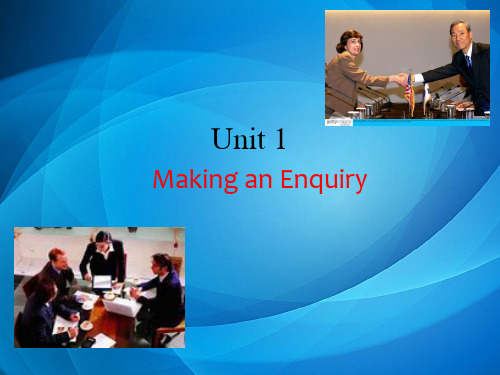
Key Knowledge
CIF与CFR相比,买卖双方所承担的义务相同。但以 CIF方式成交,卖方还承担为货物办理运输保险并支 付保险费的义务。在FOB和CFR中,由于买方是为自 己所承担的运输风险而办理保险,因而不构成一种 义务、按《通则》解释,卖方应在不迟于货物越过 船舷时,办理货运保险。在合同无明示时,卖方可 按保险条款中低责任的险别投保,投保金额最低为 CIF价格的110%。
More knowledge
3.What do you usually ask for in the enquiries?
Catalogue,sample,price-list,quotation,terms of payment, date of delivery,etc
4.How do you invite a best possible price in an enquiry?
Specific enquiries or general enquiries? 2. By what ways could you make enquiries?
By letters,fax,e-mail,telephone,through face to-face conversations at a fair or in an office,somewhere else, etc.
1) Don’t let out your exact quantity when you do not place a large order.
2) Do mention your quantity when it is sizeable.
More knowledge
3) Never indicate your price limit at which you are prepared to accept.
国际商务谈判英文版课件
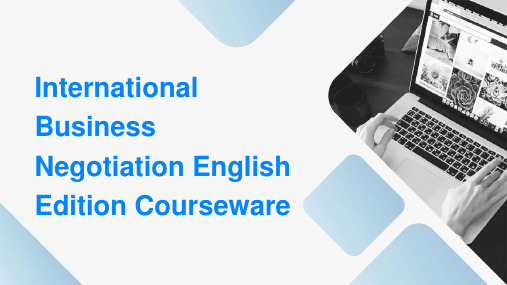
Paying attention to body language, legal expressions, and tone of voice can provide additional information
Non verbal communication
Repeating or summarizing what the other party has said can ensure that you have understanding their points correctly
Cultural factors in international business negotiations
04
Body language
Non verbal cues such as factual expressions, posts, and styles can convey messages that are just as important as what is said verbally
01
Course objectives
This course aims to provide students with the knowledge and skills necessary for effective international business negotiations
Course structure
Mediation
If necessary, a neutral third party can help resolve conflicts by facilitating communication and bridging cultural divisions
高一英语国际商务谈判用语单选题40题

高一英语国际商务谈判用语单选题40题1. In a business negotiation, you want to express your respect. Which of the following is the most appropriate?A. Listen to me!B. You should do as I say.C. May I suggest an alternative?D. Do it my way.答案:C。
在商务谈判中,C 选项“May I suggest an alternative?”(我可以提出一个替代方案吗?)是最礼貌的表达,体现了对对方的尊重和协商的态度。
A 选项“Listen to me!”(听我说!)比较强硬;B 选项“You should do as I say.”(你应该照我说的做。
)和D 选项“Do it my way.”((按我的方式做。
)都显得过于强势,不适合商务谈判的礼貌用语。
2. When you disagree with the other party in a negotiation, what can you say?A. You are wrong.B. I don't think you are right.C. That's not a good idea.D. I see your point, but I have a different perspective.答案:D。
在商务谈判中,当不同意对方观点时,D 选项“I see your point, but I have a different perspective.”(我明白你的观点,但我有不同的看法。
)既表达了对对方观点的理解,又委婉地提出了自己的不同意见,是比较礼貌的表达方式。
A 选项“You are wrong.”((你错了。
)太直接;B 选项“I don't think you are right.”((我认为你不对。
国际商务谈判(英文) 全套课件
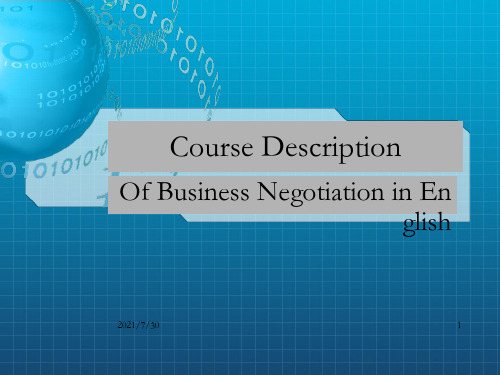
• Pear Case • House Rent
Leading-in Examples
3
1. Three Questions Course Introduction
1) What is (business) negotiation? 2) What is the purpose of (business) negotiation? 3) By what means can we win the negotiation? Or What skills are revolved in a successful negotiatio
5
2.The three features of negotiation:
• contradiction co-operation concession • 1) Two parties in contradiction try to reach an agreement on c
ooperation through discussion and concessions. • 2) The general purpose is cooperation. The concrete purpose is
n? And What are the proper English expressions being used?
4
The Answers to the First Questio n
• The business negotiations ar e tough talks happening bet ween two parties in contradi ction for the purpose of coo peration and making maxim um benefit through discussi on and concessions
国际商务谈判英文版Chapter

01
Language barriers
02
Differences in decision-making processes
Identifying common ground
Establishing Cross-Cultural Negotiation Partnerships
Facilitating effective communication
分析需求
了解对手在谈判中的需求和利益点,包括他们关注的重点、可接受的价格和交货期限等。
建立人际关系
在谈判前与对手建立良好的人际关系,可以通过电话、邮件或其他方式进行沟通,增进彼此之间的信任和合作意愿。
了解和分析对手
确定目标
制定底线
安排时间
制定谈判计划
选择合适的谈判策略
在谈判中采取合作的态度,寻求双方的共同利益和合作模式,以达到双赢的结果。
Building trust and respect
05
商务谈判的实践应用
一家中国公司和一家美国公司的贸易谈判
商务谈判的案例分析
案例一
一家德国公司和一家法国公司的技术合作谈判
案例二
一家韩国公司和一家日本公司的投资谈判
案例三
01
02
03
模拟谈判一:价格谈判
模拟谈判二:合同条款谈判
模拟谈判三:售后服务谈判
国际商务谈判英文版chapter
xx年xx月xx日
目录
contents
引言商务谈判的技巧商务谈判的策略跨文化商务谈判商务谈判的实践应用
01
引言
Definition and background
要点一
要点二
Definition
国际商务谈判 Chapter 2
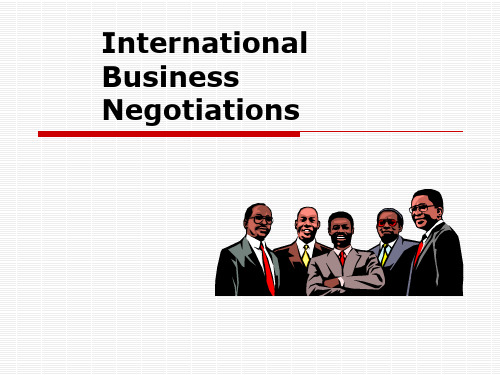
a. First hand information.
(money spending and time-consuming)
b.Second hand information.
1. International organizations a. United Nation’s Statistical Yearbook b. The World Atlas public by the World Bank c. The International Monetary Fund and The World Bank public summary economic data and occasional staff papers that evaluate issues in depth. Etc.
Preparation
Target decision Collecting information Staffing negotiation teams Choice of negotiation venues
Target decision
in addition to interest preference decision, negotiations, in view of negotiation strategy, will set at least three objective levels.
Collecting information
What is information? Information is generally esteemed as a valuable commodity in a sense that it has the power to reduce uncertainty. “the tip of be successful in negotiation is to know everyth. And to answer everyth. ”----Kissinger ( famous negotiator ) Eg. 60’s 日本竞标大庆油田设备
国际商务谈判英文版第三版
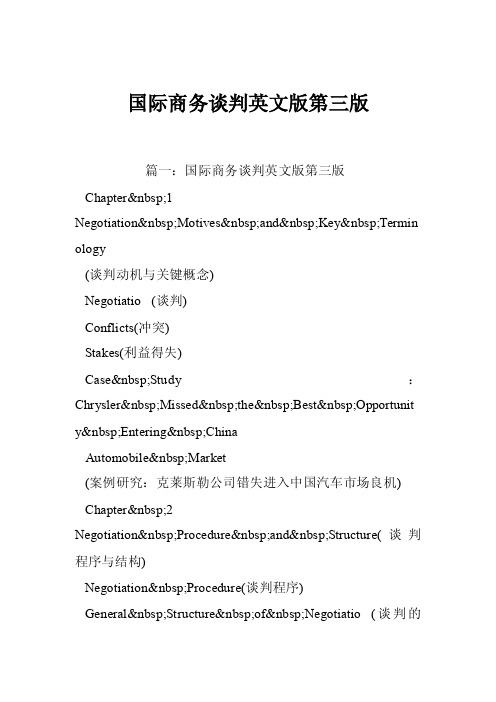
国际商务谈判英文版第三版篇一:国际商务谈判英文版第三版Chapter 1Negotiation Motives and Key Termin ology(谈判动机与关键概念)Negotiatio(谈判)Conflicts(冲突)Stakes(利益得失)Case Study:Chrysler Missed the Best Opportunit y Entering ChinaAutomobile Market(案例研究:克莱斯勒公司错失进入中国汽车市场良机) Chapter 2Negotiation Procedure and Structure(谈判程序与结构)Negotiation Procedure(谈判程序)General Structure of Negotiatio(谈判的一般结构)Structure of Business Negotiatio(贸易谈判结构)Simulation:An Economic Recession(模拟谈判:一次经济衰退)Case Study I:The Principle of Complementary Con cession(案例研究Ⅰ:对等性让步原则)Case Study II:Sino-US Negotiatio on Intellectual Property Right Protection(案例研究Ⅱ:中美知识产权谈判)Chapter 3 Negotiation Lubrication(谈判润滑剂)Target Decision(设定谈判目标)Collecting Information(信息调研)Staffing Negotiation Teams(配备谈判组成员) Choice of Negotiation Venues(谈判地点的确定)Simulation:Silk Selling(模拟谈判:丝绸销售) Case Study:Cases Showing Importance of Pre-ne gotiation Preparation(案例研究:谈判前准备工作的重要性)Chapter 4 Win-win Concept(双赢原则) Traditional Concept(传统理念)Introduction of Win-win Concept--a&nbs p;Revolution in Negotiation Field(赢一赢理念的引入——谈判界的一场革命)How Can Both Sides win(怎样实现双赢)Simulation:Financial Leasing Negotiation (模拟谈判:融资租赁谈判)Case Study:Argument between the Developing C ountries andDeveloped Countries(案例研究:发展中国家与发达国家的争论)Chapter 5 Collaborative Principled Negotiation(合作原则谈判法)Collaborative Principled Negotiation and Its Four Components(合作原则谈判法及其四个组成部分)Separate the People from the Problem(对事不对人)Focus on Interests But Not P ositio(着眼于利益而非立场)Invent Optio for Mutual Gain(创造双赢方案)Introduce Objective Criteria(引入客观评判标准) Simulation:Hotel Selling(模拟谈判:旅馆销售) Case Study:Company Policy(案例研究:公司政策)Chapter 6 Law of Interest Di stribution(利益分配法则)Needs Theory(需求理论)Application of the Needs Theory& nbsp;in Negotiation(需求理论在谈判中的应用)Three Levels of Interests at t he Domestic Level(国内谈判的三层利益)Law of Two-Level Game(双层游戏规则) Simulation:A Dam on the River(模拟谈判:河上建坝纠纷)Case Study:US-Japan Negotiatio on Semiconducto (案例研究:美日半导体谈判)Chapter 7 Negotiating Power and& nbsp;Related Facto(谈判力及相关因素) Negotiating Power and Sources of Negotiating Power(谈判力及谈判力的来源)Facto Causing the Changes of&n bsp;Negotiating Power(影响谈判力变化的因素)Application of Power Tactics(谈判力策略的应用)Estimating Negotiating Power(测量谈判力) Simulation:Negotiation on Oil Contract (模拟谈判:石油合同谈判)Case Study:Law—a Source of Negotiating Power (案例研究:法律——谈判力的一个来源)Chapter 8 Law of Trust(信任法则) Trust and Its Interpretation(信任及其解释)How to Decide a Pe on Tru sts or Is Trusted?(怎样决定一个人信任他人或者被别人信任) Determinants Affecting a Pe on”s Trustful or Mistrustful Behavior(影响一个人信任或不信任行为倾向的决定因素)Effects of Trust(信任的效应)Suggestio of Enhancing Mutual T rust(如何增进相互信任)Simulation:Market Research for a New Pr oduct(模拟谈判:新产品的市场调研)Case Study:Dilemma of the Management(案例研究:经理层的尴尬)Chapter 9 Pe onal Styles vs.Neg otiation Modes(谈判者性格类型与谈判模式)Negotiato “ Pe onal Styles(谈判者的性格类Negotiato “ Pe onal Styles and A C Model(个人性格类型与AC模型)Pe onal Styles vs.Negotiation Modes (性格类型与谈判模式)Application of Pe onality Checks(性格测试在谈判中的应用)Simulation:Global Corporation VS.Hi—tech Corporat ion(模拟谈判:全球公司与高科技公司)Case Study:Shopping in Manhattan (案例研究:在纽约曼哈顿购物)Chapter 10Game Theory and Negotiation Applic ation(博弈论及其在谈判中的应用)Game Theory,Its Assumptio and Rules(博弈论及其基本假设和规则)Co equences and the Matrix Displ(结果和矩阵排列)The Prisoner”s D ilemma(囚徒困境)Direct Determinants of the Coordin ation Goal(合作目标的直接决定因素)Simulation:China and Japan in Iron 0re&n bsp;Negotiation(模拟谈判:中国与日本铁矿石谈判中的博弈)Case Study:Making a Decision under Uncertainty (案例研究:不确定条件下的决策)Chapter 11 Distributive Negotiation  ;and Price Negotiation(两分法谈判与价格谈判)Distributive Negotiatio(两分法谈判)Price Negotiation and Negotiation Zone(价格谈判和谈判区间)Simulation:Sales for a Second-hand Car(模拟谈判:二手车销售)Case Study:An Example of the Use of&nb sp;Cost Analysis(案例研究:一个运用成本分析法的例子)Chapter 12 Complex Negotiatio(复杂谈判)Complex Negotiatio and Their Pr operties(复杂谈判及其特点)Involvement of Third Parties(第三方的参与)Coalition,Multi—party Negotiation(多方参与的谈判和谈判联合体)Simulation:Green Bank(模拟谈判:格林银行) Case Study:Iacocca Rescuing Chrysler (案例研究:艾柯卡拯救克莱斯勒公司)Chapter 13Culture Patter vs.Negotiation Patter(文化模式与谈判模式)Definition of Culture(文化的定义)Culture Patter(文化模式)Hofstede Cultural Value Study(霍夫斯泰德的文化价值研究)Simulation:Cultural Conflicts in the Negotiation of the World Bank Rural&nbs p;Water Supply Project(模拟谈判:世界银行改水项目谈判中的文化冲突)Case Study:Southern Candle”s Tour to France (案例研究:南部蜡烛公司的法国之行)篇二:国际商务谈判英文版第三版 However, some nego-tiators do not want to give up easily because the failure of the negotiation means neithercan have their interests realized. There can be another way Out. negotiating partiesmake efforts and explore alternatives to the options put forward before. A capable nego-tiator can always exhibit great initiatives and high ability by coming up with new op-tions and constructive suggestions which show the concern to the interests of both pari-ties. Quite often the final agreement of negotiations is reached based on several options. Roger Fisher and William Ury put forward an idea of “best alternative to a negotia-ted agreement (BATNA)” in their work Getting to Yes--Negotiating Agreement with-out Giving in. BATNA refers to your last choice between the conditions of the otherside and the opportunity for other better results. An example can help understand thepoint better. When you feel dissatisfied with your present salary and want to ask yourboss to raise your salary, what do you hope to put in your pocket? Is it a gun or a joboffer from another company that is a strong competitor to your present company? To find a BATNA is not an easy task. It requires a lot of investigation, considera-tion and comparison between your own options and options of other parties. Researchshows most of negotiators are ignorant of the importance of BATNA because they areoveroptimistic and overconfident. In fact most of important negotiations can not find asolution from one option. Negotiations without alternative options often end with failure. The following is an example of how to make an assessment of BATNA. Step One: Brainstorm alternatives. Assuming that a company is negotiating withits overseas distributor on commission fee. The negotiator should brainstorm to gener-atealternatives if the overseas distributor refuses to accept 6% commission on sales.The alternatives should be realistic and based on reliable information. The negotiatormay consider distributing in the overseas market through a home-based company. Asecond one may be to utilize the Internet to participate in the overseas market. A thirdalternative may be to increase the commission of the distributor.书摘()版权页: However, some nego-tiators do not want to give up easily because the failure of the negotiation means neithercan have their interests realized. There can be another way Out. negotiating partiesmake efforts and explore alternatives to the options put forward before. A capable nego-tiator can always exhibit great initiatives and high ability by coming up with new op-tions and constructive suggestions which show the concern to the interests of both pari-ties. Quite often the final agreement of negotiations is reached based on several options.Roger Fisher and Will iam Ury put forward an idea of “best alternative to a negotia-ted agreement (BATNA)” in their work Getting to Yes--Negotiating Agreement with-out Giving in. BATNA refers to your last choice between the conditions of the otherside and the opportunity for other better results. An example can help understand thepoint better. When you feeldissatisfied with your present salary and want to ask yourboss to raise your salary, what do you hope to put in your pocket? Is it a gun or a joboffer from another company that is a strong competitor to your present company?To find a BATNA is not an easy task. It requires a lot of investigation, considera-tion and comparison between your own options and options of other parties. Researchshows most of negotiators are ignorant of the importance of BATNA because they areoveroptimistic and overconfident. In fact most of important negotiations can not find asolution from one option. Negotiations without alternative options often end with failure. The following is an example of how to make an assessment of BATNA.Step One: Brainstorm alternatives. Assuming that a company is negotiating withits overseas distributor on commission fee. The negotiator should brainstorm to gener-ate alternatives if the overseas distributor refuses to accept 6% commission on sales.The alternatives should be realistic and based on reliable information. The negotiatormay consider distributing in the overseas market through a home-based company. Asecond one may be to utilize the Internet to participate in the overseas market. A thirdalternative may be to increase the commission ofthe distributor.作者简介() 白远,教授,硕士生导师,现任教于北京第二外国语学院国际经济贸易学院,主讲国际商务谈判、当代世界经济、国际贸易和国际经济合作等课程(前三门为全英语授课)。
国际商务谈判(英文)Unit 01 Making an Enquiry[精]
![国际商务谈判(英文)Unit 01 Making an Enquiry[精]](https://img.taocdn.com/s3/m/442646e7360cba1aa811da8f.png)
Making an Enquiry
Unit 1 Making an Enquiry
Introduction
An enquiry means to enquire about the terms and conditions of a transaction.In oral business negotiation, both the sellers and the buyers can make an enquiry.An enquiry is not only one of the most direct ways to get details about a product,but also an important beginning step in a business negotiation.
The more information you obtain,the more benefits you can get from the negotiation.
Unit 1 Making an Enquiry
Objectives
Know the important role in a business negotiation; Know how to make oral enquiries and the tactics of making proper enquiries; Have some knowledge of the information covered in different enquiries; Have a good command of words and expressions related to enquiry.
Unit 1 Making an Enquiry
国际商务谈判英文版

国际商务谈判英文版一、国际商务的概念但是我与此同时我们更需要注意的是,这也是一个关于国际的商务谈判,其中就没有很好的运用我们上文中所提出的观点应该在谈判之前了解对方的文化,并且应该想好一旦迟到的情况下应该如何是好,如何地应对这种文化上的差异.接下来我们来看一下另一个事例,同样是面对这种迟到的情况,日本的谈判代表是如何做的:The Concept of International Business1. What Is Business?Traditionally, business simply meant exchange or trade for things people wanted or needed, but today it has a more technical definition, which is the production, distribution, and sale of goods and service for a profit. Business includes production, i.e. the creation of products or the offer of services, distribution, sale and profit. One good example is the conversion of iron ore into metal machine tool parts. The machine tools, made up of the various parts, need to be moved from a factory to a market place or a machine dealership, which is known as distribution. The sale means the exchange of goods or services for money. For example, a machine tool is sold to someone in exchange for money or a mechanic offers a service by repairing a machine tool for money, which we call sales.From the above, we can say, business is a combination of all these activities: production, distribution and sale, through which profit or economic surplus will be created. The major goal in functioning of any business company is to make profit, the money that remains after all the expenses are paid. So, creating profit or economic surplus is a primary goal of business activities.2. What Is International Business?International business as a field of management training deals with the special features of business activities that cross national boundaries. These activities may be movements ofgoods, services, capital, or personnel; transfers of technology, information, or data, or even the supervision of employees. International business has emerged as a separate branch of management training, because the growing scale and complexity of business transactions across national boundaries gives rise to new and unique problems of management and governmental policy that have received inadequate attention in traditional areas of business and economics.Business transactions that extend between different sovereign political units are not new phenomena on the world economic scene. Some business firms have had foreign direct investments and foreign operations for many years, predominantly in (but not limited to) the fields of mining, petroleum, and agriculture. Foreign trade, moreover, has a venerable history dating back to the emergence of the nation-state. But since the end of World War II a dramatic change has occurred in the patterns of international business activities. Thousands of business firms in many nations have developed into multinational enterprises with ownership control or other links that cross national boundaries. These firms take a global view of all aspects of business ---- from markets to resources ---- and they integrate markets and production on a world scale. Traditional international trade in the form of transactions between independent firms in different nations has continued to grow. But the relative importance of trade in the total picture has declined to other forms of cross-border business transactions which have expanded more rapidly.The international business field is concerned with issues facing international companies and governments in dealing with all types of cross border business transactions. The field encompasses international transactions in commodities,international transfers of intangibles such as technology and data, and the performance of international services such as banking and transportation. It gives special attention to the multinational enterprise ---- an enterprise based in one country and operating in one or more other countries ---- and the full range of methods open to such enterprises for doing business internationally.3. The Scope of International Business Activities谈判双方友好沟通;明确谈判目标;确定谈判人员;相关性地全面搜集资料,透彻分析目标关键,周全谈判计划,制定谈判战略;谈判地点选择,行程安排确定,翻译人员的决定,到达谈判地进行谈判;实质性谈判,体现谈判风格,运用谈判策略争取自身利益最大化(或共赢局态);协议的签订;谈判总结,成果汇报。
UNIT 2 Enquiry and Offer 英语谈判口语课件(共24张PPT)
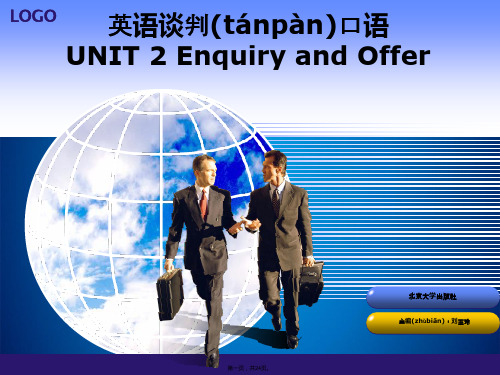
❖ 7. Please make us an offer on CIF Hong Kong bases for hand made leather gloves.
c 第五页,共24页。
YOUR SITE HERE
UNIT 2 Enquiry and Offer
❖ III. Instructions
❖ 1. Please quote us for the goods listed I enclosed inquiry sheet giving your prices CIF Jakarta.
This type is also called “creating value〞 since the goal here is to have both sides leave the negotiating feeling they had greater value than before.
It needs to be emphasized that many situations contain elements of both distributive and integrative bargaining.. For example, in negotiating a price with a customer, to some degree your interests oppose the customer (you want a higher price; he wants a lower one) but to some degree you want your interests to coincide (you want both your customer and you to satisfy both of your interests-you want to be happy; you want your customer to be happy)
- 1、下载文档前请自行甄别文档内容的完整性,平台不提供额外的编辑、内容补充、找答案等附加服务。
- 2、"仅部分预览"的文档,不可在线预览部分如存在完整性等问题,可反馈申请退款(可完整预览的文档不适用该条件!)。
- 3、如文档侵犯您的权益,请联系客服反馈,我们会尽快为您处理(人工客服工作时间:9:00-18:30)。
Unit 2 Make an offer
What
is a quotation? To make a quotation is to offer a unit price .
offering
Unit 2 Make an offer
Let’s learn some knowledge
What is an offer? The factors that form an offer What is a quotation? Firm offer vs Non—firm offer How to make a proper offer or quotation?
the differences between offer and quotation.
Understand Understand Learn
the differences between firm and non-firm offer.
how to make an offer, a counter-offer and the related
Unit 2 Make an offer
Let’s see how you have prepared: Task 3
Firm offer Non-firm offer Original offer Offerer Offeree Counter-offer Legal promise Acceptance
tactics.
Have
a good command of words and expressions related to offers
and counter-offers.
Unit 2 Make an offer
Briefing
Relative
knowledge Special terms useful expressions Skills
Unit 2 Make an offer
What is an offer?
Offer is the expression of the seller’s wish to sell particular goods under stated terms including quantity, price, time of shipment, terms of payment, etc. An offer is usually made when a seller promises to sell goods at a stated price within a stated period of time. It can develop into a contractual obligation. Once an offer is accepted by a buyer, the seller cannot revoke it. Sometimes a buyer may make a buying offer, which can be called a bid.
offer and a quotation as well as the skills and tactics of
making an offer or a quotation.
Unit 2 Make an offer
Objectives
Know
the factors that form an offer.
Unit 2 Make an offer
The factors that form an offer 1. name of commodity 2. specifications 3. quantity 4. price 5. terms of payment 6. time of shipment
发盘人 法律承诺 反还盘 接受 实盘 受盘人 原发盘 虚盘
Unit 2 Make an offer
Key Knowledge
offer 报盘,报价 firm offer 实盘 non-firm offer 虚盘 to offer for 对...报价 to give an offer 给...报盘 to submit an offer 提交报盘 to accept an offer 接受报盘 to make an offer for 对...报盘(报价)
to
Unit 2 Make an offer
出售物 offer letter 报价书 offer sheet 出售货物单 offer list/book 报价单 offer price 售价 offering date 报价有效期限 offering period 报价日 to make a bid 递价 to get a bid 得到递价
Unit 2 Make an offer
More Terms
entertain an offer 考虑报盘 to extend an offer 延长报盘 to renew an offer恢复报盘 to withdraw an offer 撤回报盘 to decline an offer谢绝报盘
Unit 2
Make an offer
Unit 2 Make an offer
Introduction
As soon as the enquiry is completed,a quotation or an offer follows.It usually takes a very short time to make a quotation or an offer,yet making a proper quotation or offer means a lot to the sellers and buyers.In this unit, you are required to understand the difference between an
